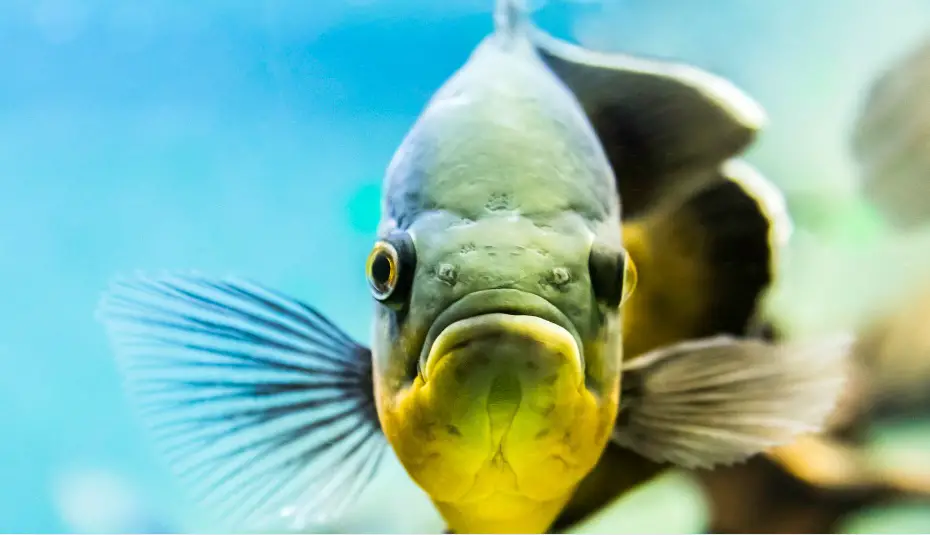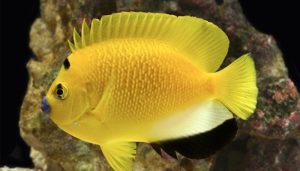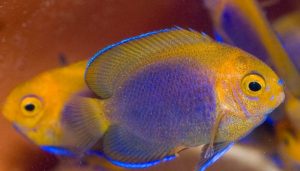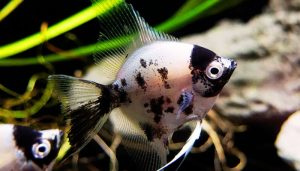Are you worried about your Oscar fish falling sick? Common Oscar fish health problems like hole-in-the-head disease, fin rot, and ich can severely impact their well-being. Knowing the signs and treatments can help keep your fish healthy and thriving.
Oscar fish often suffer from bacterial, fungal, and parasitic infections. Poor water quality and improper diet are the leading causes. Quick treatments, such as antibiotics, antifungal medications, and improved tank conditions, can prevent serious complications.
But these are just the basics. Renowned aquatic experts like Dr. Richard Brown emphasize the importance of preventive care. So, let’s dive deeper into the common Oscar fish health problems and the best ways to treat affected fish!
Table of Contents
ToggleDo Oscar Fish Get Disease
Yes, oscar fish can indeed get diseases, just like any other species of fish. Their susceptibility to fish diseases often stems from stress factors, poor water quality, or inadequate care.
In many cases, when oscar fish are introduced to a new environment or when new fish are added to the aquarium, they can become stressed, making them more vulnerable to various health issues.

It is crucial for fish owners to regularly monitor their oscar fish for any signs of illness and to maintain optimal water conditions. Routine water changes, proper filtration, and careful observation of their behavior can help prevent the onset of disease.
Additionally, oscar fish may be affected by parasites, bacterial infections, or fungal diseases if the aquarium conditions are not well managed. Poor water quality, often indicated by high levels of ammonia, nitrite, or nitrate, can lead to significant health problems.
To better understand oscar fish diseases, it’s important to educate oneself about the specific conditions that can arise within an aquarium and how to properly care for these vibrant cichlids. By being proactive and taking preventive measures, aquarists can help their oscar fish lead healthy, happy lives.
What are the Most Common Oscar Fish Diseases?
Among oscar fish, several common diseases can arise, including ich, also known as white spot disease, and hole in the head syndrome. Ich is characterized by small white spots appearing on the fish’s body and fins, often leading to irritation and stress.
It’s caused by a parasite and can spread quickly in an aquarium, particularly if the water temperature fluctuates or if the fish are stressed.
Hole in the head disease, on the other hand, manifests as lesions or holes on the head of the fish and is often linked to poor water conditions or a lack of proper nutrition.
Other prevalent health issues include fin and tail rot, which can occur due to bacterial infections often exacerbated by poor water quality. Symptoms of fin rot include frayed or discolored fins, which can indicate that the Oscar fish is suffering from a bacterial disease.
Dropsy, characterized by swelling and a distended abdomen, may also occur, often signaling that the fish is seriously ill. Understanding these common diseases is essential for any oscar fish owner, as early detection and intervention can significantly improve the chances of recovery.
The Common 7 Oscar Fish Health Problems
Oscar fish (Astronotus ocellatus) are popular aquarium fish known for their intelligence and vibrant colors. However, they are prone to several health problems, often due to poor water quality, improper diet, or stress. Here are some common health issues that Oscar fish may experience:
1. Hole-in-the-Head Disease (Hexamita)
- Symptoms: Small pits or holes on the head and lateral line, loss of appetite, weight loss, and lethargy.
- Causes: Poor water quality, nutritional deficiencies (especially vitamin D and calcium), or parasitic infection (Hexamita).
- Treatment: Improve water quality, provide a balanced diet, and treat with metronidazole or other antiparasitic medications.
2. Ich (White Spot Disease)
- Symptoms: White spots resembling salt grains on the body, fins, and gills, scratching against objects, and rapid breathing.
- Causes: Parasitic infection by Ichthyophthirius multifiliis, often triggered by stress or poor water conditions.
- Treatment: Raise the water temperature gradually to 86°F (30°C) and treat with ich medication (e.g., malachite green or copper-based treatments).
3. Fin Rot
- Symptoms: Frayed or disintegrating fins, redness, inflammation, and lethargy.
- Causes: Bacterial infection (often Aeromonas or Pseudomonas) due to poor water quality or injury.
- Treatment: Improve water quality, salt bath, perform partial water changes, and treat with antibacterial medications like erythromycin or tetracycline.
4. Bloat (Swim Bladder Disorder)
- Symptoms: Swollen abdomen, difficulty swimming, floating upside down, or sinking to the bottom.
- Causes: Overfeeding, constipation, bacterial infection, or poor water quality.
- Treatment: Fast the fish for 2-3 days, feed a peeled pea (to aid digestion), and improve water quality. If caused by infection, use antibacterial medication.
5. Pop-Eye (Exophthalmia)
- Symptoms: One or both eyes protruding abnormally, cloudiness, or redness around the eye.
- Causes: Bacterial infection, poor water quality, or physical injury.
- Treatment: Improve water quality and treat with antibacterial medications like kanamycin or erythromycin.
6. Fungal Infections
- Symptoms: White or gray cotton-like growths on the skin, fins, or mouth.
- Causes: Fungal spores (e.g., Saprolegnia) that thrive in poor water conditions or on injured tissue.
- Treatment: Improve water quality and treat with antifungal medications like methylene blue or malachite green.
7. Velvet Disease (Oodinium)
- Symptoms: Gold or rust-colored dust on the skin, rapid breathing, scratching, and lethargy.
- Causes: Parasitic infection by Oodinium.
- Treatment: Dim the lights (as the parasite is photosynthetic) and treat with copper-based medications or formalin.
8. Ammonia or Nitrite Poisoning
- Symptoms: Gasping at the surface, red or inflamed gills, lethargy, and loss of appetite.
- Causes: High levels of ammonia or nitrite in the water due to inadequate filtration or overfeeding.
- Treatment: Perform immediate water changes, test water parameters, and use water conditioners to neutralize toxins.
9. Dropsy
- Symptoms: Swollen abdomen, raised scales, lethargy, and loss of appetite.
- Causes: Bacterial infection (often Aeromonas) leading to kidney failure and fluid retention.
- Treatment: Isolate the fish, improve water quality, and treat with antibacterial medications like kanamycin. However, dropsy is often fatal in advanced stages.
10. Stress-Related Issues
- Symptoms: Loss of color, hiding, erratic swimming, or reduced appetite.
- Causes: Poor water quality, overcrowding, aggressive tank mates, or sudden changes in environment.
- Treatment: Identify and eliminate stressors, maintain stable water conditions, and provide hiding spots.
Prevention Tips:
- Maintain excellent water quality by performing regular water changes and monitoring parameters (ammonia, nitrite, nitrate, pH).
- Provide a balanced diet with high-quality pellets, live or frozen foods, and occasional vegetables.
- Avoid overcrowding and ensure the tank is large enough (minimum 55 gallons for one Oscar).
- Quarantine new fish before introducing them to the main hospital tank.
If you notice any signs of illness, act quickly to diagnose and treat the problem. Early intervention is key to ensuring your Oscar fish’s health and longevity.
The Signs of Sick Oscar Fish
Recognizing the signs of any Oscar fish common illnesses is crucial for timely intervention and treatment. Common signs of disease include changes in behavior, such as reduced activity levels, hiding more than usual, or a noticeable loss of appetite.
Fish suffering from illnesses may also display abnormal swimming patterns, such as rubbing against objects in the tank, which can indicate irritation or discomfort. Other symptoms include visible lesions, white spots on their skin, or frayed fins, which can signal bacterial infections or parasitic issues.
Additionally, observing the water conditions can provide insights into the health of the fish. If the water temperature fluctuates or if the parameters indicate poor quality, it can lead to stress and illness among Oscar fish.
Regular monitoring of water quality, along with observing the behavior and appearance of the fish, is vital for early detection of health problems. If any signs of illness are observed, consulting a veterinarian experienced in fish care can provide the best course of action to treat sick fish effectively.
Setting Up the Perfect Oscar Fish Tank
Creating the ideal Oscar fish tank is essential for their health and well-being. Oscars require ample space, as they can grow quite large and are active swimmers. A minimum tank size of 75 gallons is recommended, with proper filtration to maintain water quality.
It’s important to monitor water parameters regularly, ensuring that ammonia and nitrite levels remain at zero, while nitrate levels are kept low. Implementing a regular water change schedule is key to maintaining optimal water conditions.
Additionally, the tank should be equipped with hiding spots and decorations that provide security for the Oscar fish. Smooth rocks, caves, and sturdy plants can create a comfortable environment.
When introducing new fish to the aquarium, it’s crucial to acclimate them properly to prevent stress and disease transmission. Using aquarium salt can help treat certain ailments and improve overall fish health.
By prioritizing tank setup and maintenance, aquarists can create a thriving habitat for their Oscar fish, minimizing the risk of health problems.
Conclusion
In conclusion, understanding common Oscar fish health problems and how to treat them is vital for any aquarist. Oscars are beautiful and engaging freshwater fish that require proper care and attention to thrive. By being aware of the common diseases they may encounter, such as ich, hole in the head hith disease, and various bacterial infections, fish owners can take proactive steps to maintain the health of their aquatic companions. Regularly monitoring water quality, providing a suitable tank environment, and recognizing the signs of Oscar fish illness are all essential elements in ensuring the longevity and happiness of your fish.
Ultimately, with the right knowledge and commitment to Tiger Oscar fish care, Oscar fish can lead healthy lives in a well-maintained aquarium. By fostering a healthy environment and promptly addressing any signs of disease, aquarists can enjoy the vibrant personalities and beauty of their Oscar fish for many years to come. Understanding Oscar fish diseases and their treatment not only benefits the fish but also enhances the overall experience of keeping these fascinating cichlids.
Recommended posts
- Caring for Tiger Oscar Eggs: Best Practices for Aquarists
- Best Oscar Aquarium Size: Tank Requirements & Setup Guide
- How Long Do Tiger Oscars Live? Essential Care & Longevity Tips
- Oscar Fish with Hole in the Head Disease (Causes & Best Treatment)
- Essential Oscar Fish pH Level – Aquarium Care Guide & Tips
- Signs My Tiger Oscar Cichlid Is Dying: Warning Symptoms & Solutions
- What Can I Feed My Oscar Fish from Home: (Budget-Friendly)




